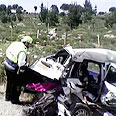
Another scene of carnage on the roads
Photo: ZAKA
According to the website of the National Road Safety Authority 28,974 men, women and children have lost their lives in road accidents since Israel was established. A little more than two weeks ago we remembered the 22,123 men, women and children who killed in wars and terror attacks since 1860, the year that the first Jewish settlers left the secure walls of Jerusalem to build new Jewish neighborhoods.
The latter number rose to 22,125 this week, but it still remains significantly lower than the number of people who have died on Israel's roads. On Channel 2, after a news report on the deadly road accidents near Beitar Ilit and the Drorim junction last weekend, Oded Ben-Ami said something like "What must be done to stop this?."
All in five minutes
A few hours after I saw Oded Ben-Ami on the television I drove to the supermarket near our house. In those five minutes I saw several indirect answers to his question. One block away from where I live I saw a car with a police license plate parked next to a red-and-white curbstone, although there was plenty of parking space less than ten meters away from there.
On the main road I was overtaken by several cars that exceeded the speed limit – 60 km/h – by at least 20 km/h. Two drivers listened to very loud music, and while I waited for a traffic light I noticed two young children in the back of a car without seatbelts. Their mother – who held a cell phone between her head and her shoulder – accelerated very fast as soon as the orange light came into view.
Disregard for the law
Traffic offenses are not the only way in which Israelis express their disrespect for and lack of faith in the law. On the day before Lag BaOmer children and teenagers all over the country collected – stole, more correctly - wood for the bonfires. In our street, in an average middle-class neighborhood, a group of teenagers raided a building site, taking – among other things – a perfectly good wooden ladder, which they then proceeded to prepare for kindling by smashing it to bits with a large stones they found right across from our building.
Of course, after this was done the stones were left on the sidewalk and in the street. When I wanted to go out and tell the kids that at least they should have the decency of not leaving the stones on the street my wife, who was born and raised in Israel, told me not to get involved: they probably would sass me and might hurt me or my family, and the police would not do anything anyway.
My father-in-law – who like my wife is a model citizen – had given me a similar reaction a few months ago when I told him about a local pizza parlor where children who were clearly much younger than 16 years old were filling out lotto forms.
Relative law
With doctors, mayors, state officials, politicians, rabbis and so many others involved in widely published corruption cases and other law violations it is no miracle that the average Israeli believes that 'the law' is only a relative notion. Sometimes it appears to me that most Israelis simply believe that the state is our greatest enemy, and that by by-passing that state's laws they are simply trying to survive in some kind of eternal war.
Whoever willingly and openly obeys those laws is considered by many Israelis to be either a sucker or some sort of collaborator with the forces of evil. All this applies as well on the road. Many obey traffic laws only in order not to get caught, not because we sincerely believe that the law is meant to protect us and our fellow road users.
Okay, not all laws make sense, and some could and should be changed. Also, a lot of money has to be invested in improving Israel's roads. Finally, those who pretend or are supposed to lead us do not exactly try as hard as they can to set a good example.
Still, all that is not an excuse to turn constantly breaking the law into an accepted and almost legitimate way of life. This country is what we make of it, and no matter how wrong other people's behavior may be, we remain responsible for our own.
We have to understand, and our so-called leaders have to convince us, that what is good for the country in the end will be good for us. Only when we become convinced that the laws and those who make and enforce them are really there to protect us and to make our lives more livable, will our roads become truly safer. That a more law-abiding Israeli society will probably also be more just, more prosperous, stronger and more secure is a welcome bonus, I would say.
The author is a historian, who immigrated from the Netherlands in 1995.















